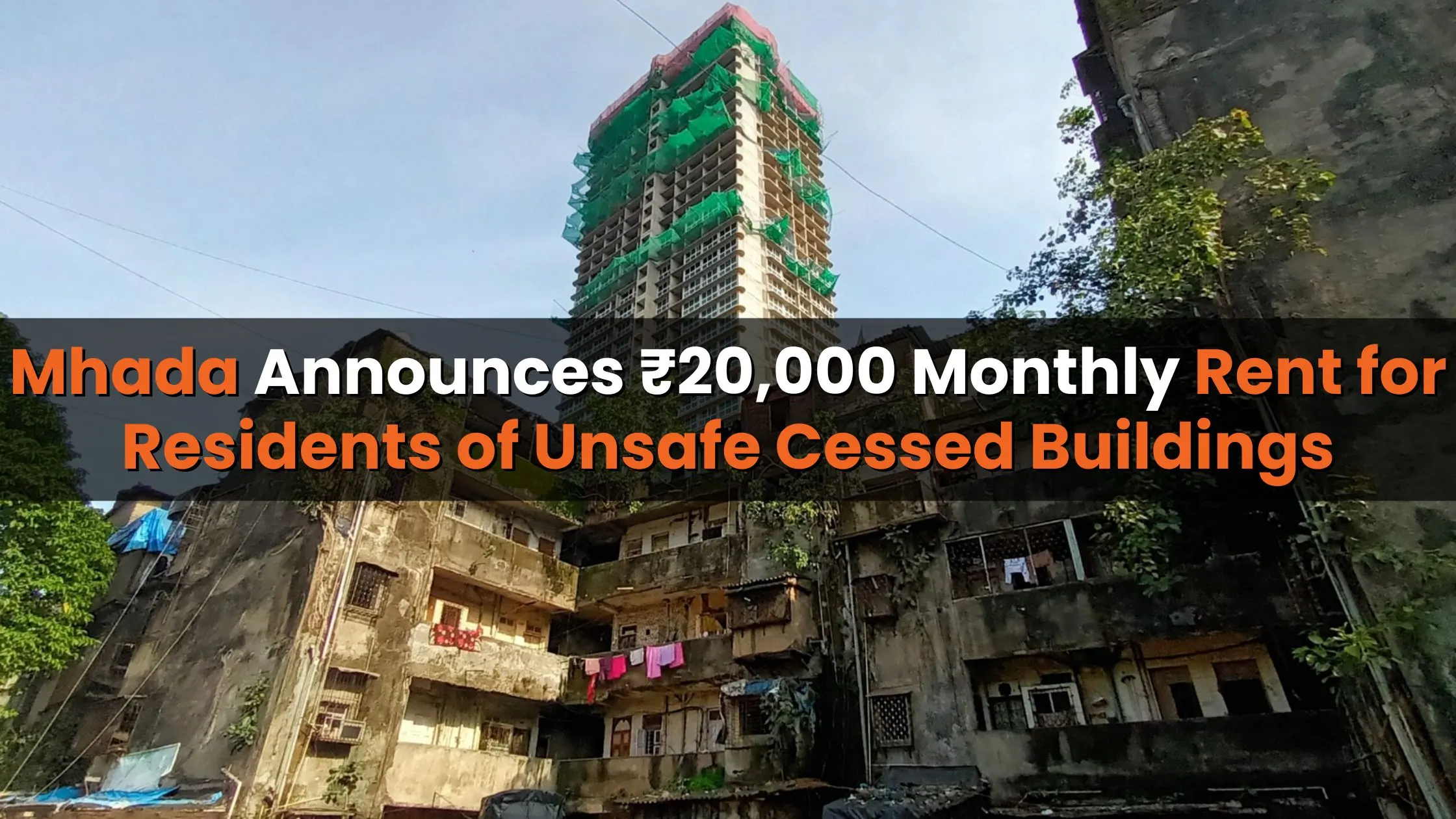Table of Content
▲
In a landmark decision aimed at ensuring the safety and welfare of tenants, the Maharashtra Housing and Area Development Authority (Mhada) has announced a monthly rent provision of ₹20,000 for residents of dangerously dilapidated cessed buildings in Mumbai. This initiative comes in the wake of a pre-monsoon survey that identified 96 such buildings as unsafe for habitation.
Understanding Cessed Buildings and Their Challenges
Cessed buildings are rent-controlled properties in Mumbai subject to a cess or tax collected by Mhada. The cess, contributed by tenants, is primarily used for repairing and reconstructing old and dilapidated structures. However, the aging infrastructure and population density in Mumbai have made many of these buildings increasingly vulnerable to structural failures.
According to Mhada, there are over 13,000 cessed buildings in Mumbai’s island city. The 96 buildings identified as hazardous currently house 2,577 residential and 585 non-residential tenants, highlighting the urgent need for relocation to safe accommodations.
Key Highlights of Mhada’s Announcement
1. Rent Provision for Alternate Accommodation:
Mhada has pledged ₹20,000 per month to tenants of unsafe cessed buildings to secure alternate housing while their buildings are reconstructed.
2. Transit Housing Initiatives:
The Mumbai Building Repairs and Reconstruction Board, a unit of Mhada, plans to lease 400 transit tenements, measuring between 180 sq ft and 250 sq ft, through external agencies for three years.
3. Limited Existing Infrastructure:
Currently, only 786 transit tenements are available for immediate use, necessitating external leasing to accommodate all affected residents.
4. Financial Arrangements:
Expenses for the rent and transit housing, including maintenance costs, will be recoverable from private developers or cooperative housing societies redeveloping the properties.
Also Read: Maharashtra Set to Achieve 100% Target Under PMAY Scheme: CM Fadnavis
Steps to Address Housing Challenges
Mhada’s decision is part of its broader commitment to ensure tenant safety and urban renewal. Alongside financial provisions, the authority has emphasized proactive measures such as eviction notices for unsafe buildings and prioritizing redevelopment approvals.
Last month, the board issued eviction notices to 184 residential tenants, urging them to shift to transit camps. However, only three tenants relocated, reflecting the logistical challenges of large-scale evacuations and accommodations.
Impact on Tenants and Urban Development
The initiative not only addresses the immediate safety concerns of tenants but also contributes to Mumbai’s long-term urban renewal. By providing financial support for alternate housing, Mhada is ensuring that tenants are not displaced while redevelopment projects are underway.
This decision sets a precedent for effective collaboration between public authorities, private developers, and residents to tackle housing challenges in one of India’s most populous cities.
Conclusion
Mhada’s provision of ₹20,000 monthly rent to tenants of dangerous cessed buildings reflects its commitment to safeguarding citizens and fostering sustainable urban development. While challenges remain in implementing the policy, this initiative is a critical step towards ensuring the safety, stability, and well-being of Mumbai’s residents.
This move underscores the importance of proactive governance in addressing the complexities of housing in urban India, paving the way for a safer and more inclusive city.
Follow AquireAcers Whatsapp Channel to Stay Updated With The Latest Real Estate News






_1771582392.webp)
_1771577585.webp)
Ans 1. Cessed buildings are rent-controlled properties in Mumbai where tenants pay a cess or tax to Mhada. This cess is used primarily for repairing and reconstructing old and dilapidated buildings.
Ans 2. Mhada has announced this to provide financial support for tenants living in 96 dangerously dilapidated cessed buildings, enabling them to secure safe alternate accommodation during redevelopment.
Ans 3. A pre-monsoon survey identified 96 unsafe cessed buildings housing 2,577 residential tenants and 585 non-residential tenants.
Ans 4. The board, a unit of Mhada, plans to lease 400 transit tenements (180–250 sq ft) from external agencies for a three-year period to temporarily house displaced tenants.
Ans 5. Currently, only 786 transit tenements are available immediately, which is insufficient for all affected tenants, hence the need to lease additional tenements.
Ans 6. The costs will be recovered from private developers or cooperative housing societies involved in the redevelopment of the affected buildings.
Ans 7. Mhada has issued eviction notices to residents of unsafe buildings, urged tenants to shift to transit camps, and prioritized redevelopment approvals to accelerate reconstruction.
Ans 8. Logistical challenges, including limited transit housing availability and relocation difficulties, have slowed tenant movement from unsafe buildings.
Ans 9. Tenants receive financial support to live safely during redevelopment, while the city benefits from urban renewal and safer housing infrastructure.
Ans 10. To ensure tenant safety, promote sustainable urban development, and facilitate redevelopment of Mumbai’s aging and hazardous cessed buildings.